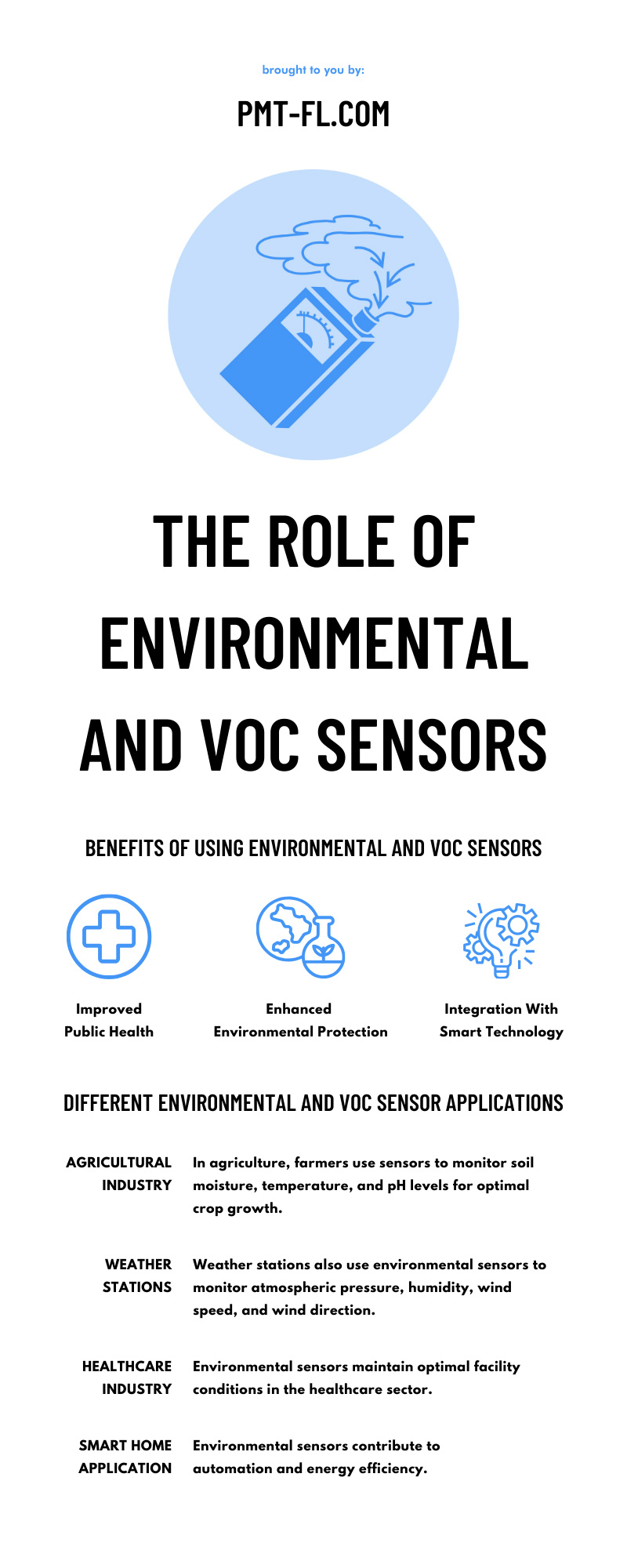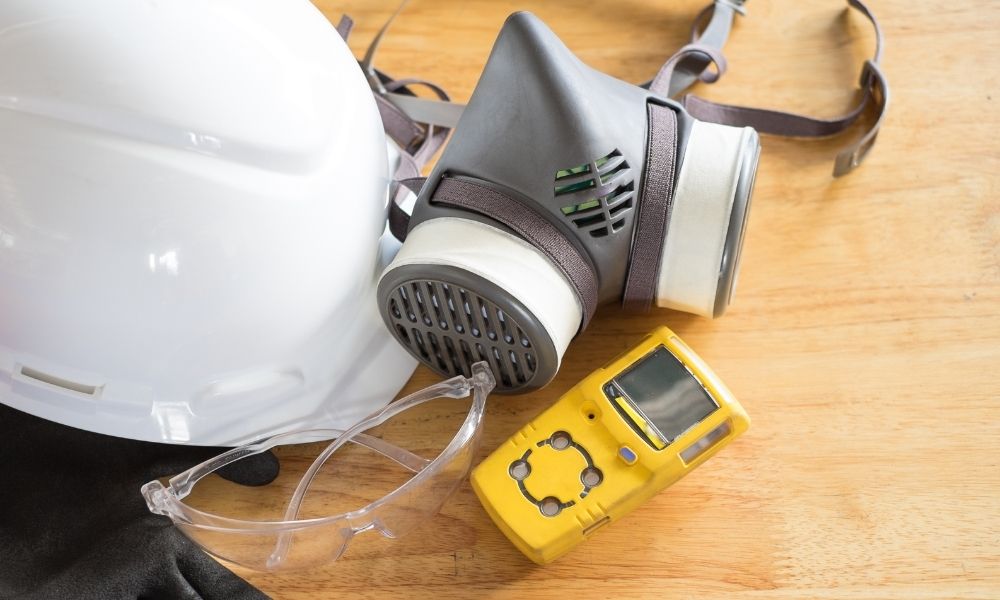With increasing pollution and environmental degradation concerns, the need for environmental and volatile organic compounds (VOCs) sensing technology is more critical than ever. These advanced technologies provide a powerful and indispensable tool that enables us to analyze and address environmental concerns. Monitoring and detecting changes in air quality, water pollution, and other environmental parameters can help us safeguard ecosystems, improve public health, and facilitate sustainability.
With precise data and real-time insights from environmental and VOC sensors, we can mitigate environmental risks and ensure a healthy future. Explore the role of environmental and VOC sensors, and discover how you can maximize this technology.
What Are Environmental and VOC Sensors?
Environmental sensors measure various environmental parameters, such as temperature, humidity, air quality, light intensity, and soil moisture. They come in various types to suit many applications and provide critical data in ecological research, weather forecasting, agricultural planning, and pollution control.
VOC sensors gauge the concentration of various VOCs in the environment. VOCs are organic chemicals with high vapor pressure under ordinary room temperature conditions, such as formaldehyde and benzene. These compounds often have low water solubility and come from a variety of sources, including the following:
- Paint
- Cleaning supplies
- Pesticides
- Building materials
- Furnishings
High concentrations of VOCs can pose risks to human health and the environment, making VOC sensors particularly important for maintaining indoor air quality and ensuring public health and safety.
Different Types of Environmental and VOC Sensors
Environmental and VOC sensors come in many forms and monitor different aspects of our surroundings. Some of the most common types of sensors include the following:
Temperature Sensors
Temperature sensors measure changes in physical temperature. They are common in healthcare, agriculture, and meteorology.
Humidity Sensors
Humidity sensors measure the water vapor in the air or a gas. They are vital in agriculture because they farmers help maintain the ideal moisture levels for crops. They also play a crucial role in healthcare, ensuring a comfortable and safe environment for patients.
Light Sensors
Light sensors measure the intensity of light. They are common in smart homes, where homeowners can adjust lighting based on natural light levels. This feature aids energy conservation and reduces utility bills.
Water Quality Sensors
Water quality environmental sensors ensure the safety and cleanliness of water. These sensors measure various water quality parameters, such as pH levels, turbidity, temperature, and dissolved oxygen (DO).
Air Quality Sensors
Air quality sensors detect and measure the level of pollutants in the air, including VOCs. They are essential for monitoring pollution in cities and industrial areas and provide information on environmental and safety concerns in your area.
These sensors play unique roles in monitoring environmental conditions thanks to their multiple applications.
At Precision Measurement Technologies, we sell environmental sensors that measure humidity, temperature, and air quality. Our selection of sensors provides the best solution for multiple applications, from phones to air purifiers, enhancing your abilities for humidity, temperature, and air quality detection.
Benefits of Using Environmental and VOC Sensors
Environmental and VOC sensors offer several notable benefits to users. They provide crucial data that can help individuals and communities raise awareness of surrounding environmental conditions. These sensors can even collaborate with smart technology!
Improved Public Health
Monitoring and detecting harmful pollutants and VOCs in the environment can safeguard public health. Early detection of hazardous substances, such as VOCs, facilitates timely interventions, reducing potential health risks like respiratory infections linked to pollution.
VOC sensors in air purifiers can alert you of hazardous conditions, such as high levels of air pollution or harmful VOCs. Then, you can respond by avoiding the area.
Enhanced Environmental Protection
Environmental sensors can also help you measure air and water quality, temperature, and humidity. The real-time data aids in protecting and preserving our ecosystems. Accurate measurements of environmental conditions allow policy-makers to make informed decisions that can mitigate environmental degradation and its impacts.
Lowered Workplace Risk
VOC and environmental sensors can detect risks posed by harmful pollutants. Then, employers and employees can protect their working conditions. These sensors can alert workers to spikes in pollutant levels, enabling them to take corrective actions, such as ventilating an area or evacuating.
Additionally, environmental sensors in industrial automation can enhance workplace conditions by encouraging employers to implement air purification systems to prevent high VOC levels.
Integration With Smart Technology
Environmental and VOC sensors can integrate with smart technologies, giving users greater control over their environments. In a smart home setup, these sensors can monitor air quality, temperature, and humidity, creating a comfortable and healthy living space. Additionally, they can send alerts to the homeowner’s smartphone or other connected devices when pollutant levels rise above a certain threshold.
Different Environmental and VOC Sensor Applications
The applications for environmental and VOC sensors span several industries. Let’s look at a few right now.
Agricultural Industry
In agriculture, farmers use sensors to monitor soil moisture, temperature, and pH levels for optimal crop growth. These sensors provide farmers with vital data that can help them improve irrigation and fertilization methods.
Weather Stations
Weather stations also use environmental sensors to monitor atmospheric pressure, humidity, wind speed, and wind direction. This data helps meteorologists predict forecasts and share response strategies for extreme weather events.
Healthcare Industry
Environmental sensors maintain optimal facility conditions in the healthcare sector. Adjusting temperature and humidity creates a comfortable and safe environment for patients while preserving the integrity of medical supplies and equipment.
SMART Home Application
Environmental sensors contribute to automation and energy efficiency. Homeowners can use light sensors to adjust artificial lighting based on natural light levels and temperature sensors to automate heating and cooling systems based on their preferences.
The Future With Environmental and VOC Sensors
Environmental and VOC sensors are the technology solutions of the future. Using environmental and VOC sensors for environmental preservation can improve sustainability efforts. Applying these sensors in home appliances, such as HVAC systems, air purifiers, and SMART systems, guarantees healthier lifestyles. Precise environmental and VOC sensors in industrial technology can enhance the growth of many industries.
The role of environmental and VOC sensors is essential to healthy lifestyles and sustainable practices. Upgrade your products with environmental and VOC sensors from Precision Measurement Technologies!


